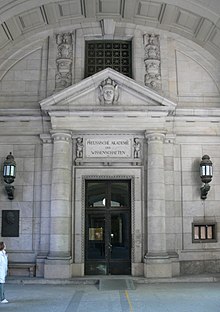Cartel of the Academies
The Kartell der Akademien (officially the Association of Scientific Corporations ) was the umbrella organization of German-speaking academies from 1893 to around 1945.
history

The cartel was founded in Leipzig in 1893 on the initiative of the academies in Berlin and Vienna, with the academies in Göttingen and Munich also participating, while the Prussian Academy in Berlin was involved in the preparation, but initially did not join. According to the statute, other academies could join; a limitation to German-speaking academies was not initially intended. The aim of the association was to stimulate scientific work and promote possible collaborations.
On the initiative of the cartel, the IAA ( International Association of Academies ) was founded, which took place in 1899 under the direction of the Prussian Academy. The IAA existed until the beginning of the First World War and was never formally dissolved. It united the four German academies in Berlin, Göttingen, Leipzig and Munich, the Vienna academy and 19 other academies, mostly from Europe. These 24 academies worked successfully in the 2 sections for natural sciences and humanities in 31 scientific companies.
In 1906 the Berlin Academy became a member of the cartel, and in 1911 the newly founded Heidelberg Academy.
This group of six academies existed until 1940, when the cartel was to be transformed into the Reich Association of German Academies through government intervention .
literature
- Conrad Grau : The science academies in German society: The cartel from 1893-1940. In: Christoph J. Scriba: The nation's elite in the Third Reich. The relationship of academies and their scientific environment to National Socialism . Leopoldina Symposium, German Academy of Natural Scientists Leopoldina eV, Halle (Saale) 1995.
- Martin Gierl: History and Organization. Institutionalization as a communication process using the example of the science academies around 1900 (Treatises of the Academy of Sciences in Göttingen, Philological-Historical Class, Volume 3, 233) Göttingen: Vandenhoeck & Ruprecht, 2007.